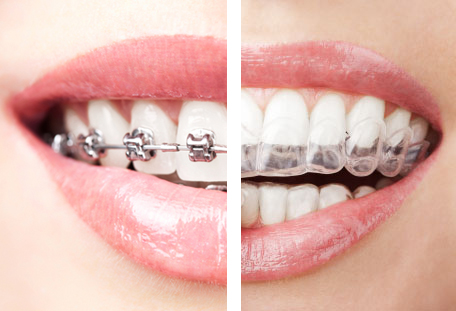What Types of Orthodontic Treatment Best for You?

Often time we want to get braces but we do not know about the possible options available. Braces are typically used to correct teeth that are not in the proper position. The braces treatment is called orthodontics. Orthodontics is the specialty of dentistry that deals with the assessment, diagnosis, and treatment of misaligned teeth. Qualified orthodontic practitioners should be consulted if you have a problem with your teeth\’ alignment.
Orthodontic treatment options range from traditional metal braces to more sophisticated invisible aligners. For the best outcomes, the orthodontist may walk you through several teeth straightening options based on your preferences and the best possible solution for you based on your oral examinations.
- Invisalign: Invisalign also known as clear braces in Brampton is a set of removable transparent plastic aligners. These Invisalign aligners or plastic trays can be used to treat a variety of orthodontic issues, including crooked teeth, malocclusion, and tooth gaps. These aligners, also known as trays, are custom-made to fit the shape of your teeth, allowing them to fit tightly over your teeth and be worn all day, aside from chewing and cleaning. Based on a 3-D picture of their teeth, an orthodontist manufactures the Invisalign trays. A new aligner will be provided every two weeks, personalizing the teeth\’ new location.
- Metal conventional braces: The standard way of straightening teeth is using metal braces. It is the cheapest option when compared to more complex procedures. This method involves the use of metal brackets, elastics, and a detachable wire to move the teeth into the correct locations. Changes to the wire and elastics can be made at follow-ups.
- Ceramic braces: Ceramic braces work in the same way as standard braces, except instead of using metal brackets, they employ ceramic brackets. Due to the clear aesthetic element, these are virtually unnoticeable when compared to metal ones.
- Lingual braces: Traditional braces are identical to lingual braces, except that they are worn on the inside surfaces of the teeth. As a result, they provide a fantastic cosmetic solution who wants to straighten their teeth without wearing braces.
Which orthodontics treatment should I go with?
The appearance of the braces will not be the only factor in your decision. Cost, hygiene, and the outcome are among other things that one should consider before opting for your desired type of orthodontic treatment.
- Some patients are concerned about how they might appear with braces. Even after everybody else has forgotten about the braces, they might still be self-conscious about them. If the appearance of the braces is an issue for you, try lingual or ceramic braces, which are nearly undetectable.
- Certain treatment alternatives are more costly than others. For example, Lingual braces are more expensive than conventional orthodontic methods due to the technology necessary to personalize the brackets and the time required in the lab to produce the brackets. Because of the materials used, ceramic braces are more costly than metal braces.
- You should assess if you are an excellent fit for orthodontic treatment before proceeding. All braces need additional dental care on the part of the patient. Braces necessitate extra careful cleaning and flossing to prevent teeth from staining around the braces. Some individuals will need to wait a bit before getting braces to improve their attitude to cleaning their teeth.
As every individual has a different set of teeth, mouth, or jaw, each orthodontic case is special. A procedure that works well for one individual may not be appropriate for someone else. After an appointment, an orthodontist can tell you what alternatives are available for you. Not all orthodontic treatment options are appropriate for every situation. Different approaches are employed depending on the type of orthodontic condition being addressed.
Choosing the optimal treatment strategy is frequently a collective effort. Most patients require assistance from others to make the best decision. After an inspection, your orthodontist will be able to tell you which alternatives are suitable for you. If you have a preference for treatment, discuss it with your orthodontist and seek their professional advice.



Leave A Comment